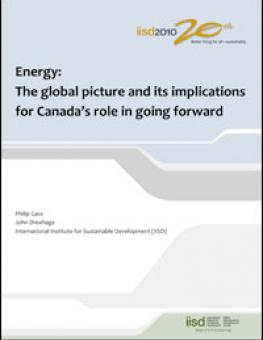
Energy: The global picture and its implications for Canada's role in going forward
This paper, prepared by IISD for the Banff Dialogue on a Canadian National Clean Energy Strategy, looks at the current global energy picture and examines its potential progression over the next decades.
Philip Gass and John Drexhage look at the integration of security, investment and environmental approaches and how the world will have to react to changes in the global economic and energy policy dynamics, particularly given the rise of the major developing economies and the evolving China-US power structure.
Participating experts
You might also be interested in
How Fossil Fuels Drive Inflation and Make Life Less Affordable for Canadians
New report takes closer look at how Canada’s dependence on fossil fuels impacts energy costs and prices of essentials such as transportation, home heating, and housing.
IISD Applauds Canada’s Reaffirmation to End Domestic Public Finance for Fossil Fuels in Budget 2024
Today's federal budget announcement delivers new measures to support affordability and reaffirms Canada’s commitments on climate action.
The Cost of Fossil Fuel Reliance
Government support for fossil fuels reached at least USD 1.5 trillion in 2023, new data shows.
Increased Support Needed to Achieve India's Clean Energy Goals
India is on track to achieve many of its 2030 clean energy goals but needs to step up government support measures to accelerate the deployment of offshore wind, electric vehicles, and green hydrogen, according to a new report.